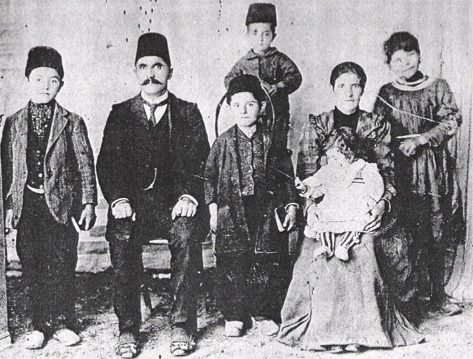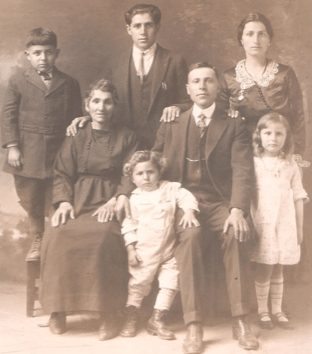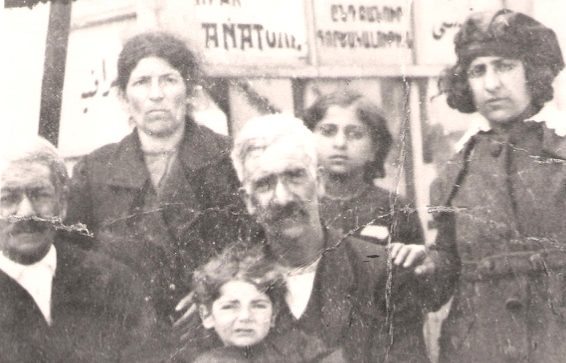
By Matthew Ari Jendian
“Those who cannot remember the past are condemned to repeat it.”—Spanish philosopher George Santayana (1905)
In 2015, among many other things, we commemorate
- the 67th anniversary of the UN pledge to achieve “the promotion of universal respect for and observance of human rights and fundamental freedoms” through the passage of the Universal Declaration of Human Rights in 1948;
- the 67th anniversary of the UN Convention on the Prevention and Punishment of the Crime of Genocide that defined and codified genocide; and
- the 100th anniversary of the commencement of the Armenian genocide, perpetrated by the Ottoman Turkish government from 1915 to 1923.
While the 20th century observed major advances in the forging of international agreements and treaties with respect to human rights, genocide and other crimes against humanity, it was also one of the bloodiest centuries on record. And the bloodiness has continued into the 21st century. Some scholars suggest at least 15 major genocides have occurred since WWII, during which some 15 million people have been massacred. Legal agreements and international laws—which have been undermined through weak enforcement and limited application—are incapable, by themselves, of preventing genocide.
What does the anti-genocidal slogan “Never Again” mean? Does it mean, as David Rieff facetiously interprets, “Never again will Germans kill Jews in the 1940s in Europe,” or, similarly, “Never again will over a million Armenians be slaughtered in Asia Minor”? No, “Never Again” is uttered as an aspirational hope that we will take action—at the individual, national, and international levels—to prevent crimes against humanity, particularly genocide.
Yet, as recently as 2006, then UN Secretary-General Kofi Annan pondered whether the United Nations was an effective defender of human rights. While condemning the world’s failure to halt the bloodshed in the Darfur region of Sudan, Annan stated that “60 years after the liberation of the Nazi death camps and 30 years after the Cambodian killing fields, the promise of ‘never again’ is ringing hollow.”
The genocide campaign carried out against the Darfur region since 2003 by the Sudanese government of President Omar al-Bashir has resulted in the deaths of more than 300,000 and the displacement of more than three million Darfuris. Unfortunately, despite the issuance of a warrant for the arrest of President al-Bashir on 10 counts of crimes against humanity, war crimes and genocide by the International Criminal Court. In addition, despite the ceasefire of 2010 between the Sudanese government and the Darfuri rebels, and the deployment of a UN Security Force of 4,200 peacekeepers in 2011, violence continues to escalate with more than a half million people displaced in 2014 and 36,000 more during the first month of 2015.

taken in Kingsburg, Calif., circa 1925. My
grandfather Avedis Antranikian (standing, center
top) with Abrigsemeh Antranikian (mother),
Yeghiazar Hovhannisian (brother, both seated),
Elize (nee Voskerichian, sister-in-law, standing
at right), nephews and niece, (standing, left to
right) John Ohanesian, Armen Ohanesian, and
Roxie Yenovkian. The three children of Yeghiazar
and Elize were born in the United States. My
grandfather Avedis passed away in Fresno, at
the age of 67.
Why do we stand idly by while tragedy unfolds? It is not true that many people do not know what is going on. It is not true that many people do not fully appreciate the magnitude of the situation. The real reason the United States has not done what it could and should do to stop genocide throughout the 20th century and today has not been because of lack of knowledge or influence. According to Samantha Power, it is a lack of will: “U.S. leaders knew what was going on, believed it to be wrong, but were not prepared to invest the military, financial, diplomatic, and domestic political capital needed to stop genocide.”
But in a democracy, it is not enough to say that our president and our leaders failed us, for we the people have the ability to create enough pressure for an administration to act. And if the world does not act and remains silent, we send a clear message to current and future perpetrators of genocide. Indeed, Hitler’s comment, eight days before invading Poland in 1939, “Who today, after all, speaks of the annihilation of the Armenians,” demonstrates his awareness of the fact that within two decades what had been the most important international human rights catastrophe of the 20th century had been forgotten.
Passive participation reassures perpetrators of the legitimacy of their actions and reveals in a breakdown of empathy. As Jane Elliot reminds us, “To remain silent is to cooperate with the oppressor.”
According to Samantha Power, the United States should stop genocide for two reasons: “1) We have a moral responsibility to act; and 2) It is in our enlightened self-interest to act.” Allowing genocide undermines regional and international stability, creates militarized refugees and signals dictators that hate and murder are permissible tools for state usage.
Nevertheless, this burden to act must be shared. It is not enough for the U.S. government to engage in a unilateral intervention, as we primarily saw in Iraq since 2003. The United States needs to exert whatever influence and leadership it has left in the world—and let’s be honest and recognize that the U.S. government has lost some of its credibility in the world due to our misadventures into Iraq. Our government, and we the people, must use our voice and our remaining influence to ensure that the United Nations or some other coalition of countries acts to prevent further atrocities in Darfur and in other places around the globe.
Moving from the societal to the individual level, I want to reflect on our personal responsibility in thinking about and responding to genocide. We must not think about cases of genocide in isolation and focus on our particular group’s experience alone. The term genocide, or holocaust, is not copyrighted; it does not belong to any one group. We must recognize and learn from all genocides and join with one other, across ethnic and national boundaries, in order to prevent new genocides from occurring.
“Pain that is not transformed is transmitted.”—Fr. Richard Rohr, a Franciscan priest of the Roman Catholic Church and founder of the Center for Action and Contemplation in Albuquerque, N.M.
I am a descendant of genocide survivors. Three of my four grandparents survived the genocide perpetrated by the Ottoman Turkish government beginning in 1915, and I am working on my second book, Becoming American, Remaining Ethnic: One Family’s Journey from Martyrdom to Good News, memorializing the first names of my grandfathers, Mardiros (i.e., literally “Martyr”) and Avedis (i.e., “Good News,” as in the Gospel of Jesus Christ).
As my brother Micah recalled during his address in San Diego on the 90th anniversary of the Armenian genocide, it’s important for us to “acknowledge the deep pain of our collective experience,” to “examine the effects of the Genocide on the survivors, those raised by survivors, and those raised by those raised by survivors,” to “not be retributive but restorative in nature” and to “tell our stories and keep alive our memories as a means of transforming and transcending our experience.” Indeed, our painful experiences can help us connect with the pain of others experiencing or having experienced similar forms of oppression.
The quote from Rev. Martin Niemoller—a German theologian and Lutheran pastor who initially supported Hitler, then opposed him, and was arrested in 1937 and sent to a concentration camp where he stayed until the end of WWII in 1945— reminds us all of the personal costs for not speaking up on behalf of others: “First they came for the Communists, but I was not a Communist, so I said nothing. Then they came for the Social Democrats, but I was not a Social Democrat, so I did nothing. Then came the trade unionists, but I was not a trade unionist. And then they came for the Jews, but I was not a Jew, so I did little. Then, when they came for me, there was no one left to stand up for me.”
As Rev. Dr. Martin Luther King, Jr., reminds us in his Letter from the Birmingham Jail, “Injustice anywhere is a threat to justice everywhere. We are bound by an inescapable garment of mutuality, whatever affects one directly, affects all indirectly.”
Therefore, our demonstrations and protests must extend beyond ethnic boundaries to stand against all such discrimination.
This means that
- each of us must recognize and confront our ethnocentrism—our belief that our ethnic group is the best and right one;
- each of us must recognize and confront our xenophobia—our fear of outsiders or strangers;
- each of us must recognize others as “human, just like me,” and develop empathy in which we identify with the circumstances and pain of others, for empathy is essential for the resolution of oppression and conflict;
- each of us must recognize the biological fact that every human being is related to every other human being (genetically, we are among the most similar of all species on the planet; in fact, each person is at least a 50th cousin of any other person on the globe and we have more in common than we do different); and
- each of us needs to be able to envision a world of inclusion. And while changes can develop in individuals’ minds and hearts, they must also become manifest in actions if social change is to take place.
I want to emphasize the importance of action. You have heard it said, “Knowledge is power.” I disagree with that. Knowledge is not power, but merely potential power. Knowledge becomes powerful when it is acted upon. You could have all the knowledge in the world, but if you don’t put it into action, it is useless.

with her uncles (her father’s brothers) taken at the dock as they board ship in 1920 to come to America.
Back row left to right, aunt Altoun, Mariam and sister Shabouhie, both orphaned, their parents
were killed at the onslaught of the 1915 Genocide; seated left to right, uncle Alexan and Janig, and
cousin Baidzar, the daughter of Janig and Altoun. My grandmother Mariam, the last living survivor of
the Genocide of her family, passed away in Mission Hills, California at the age of 88.
So, each of us must pursue educational and societal programs that broaden our boundaries and experiences of the “other.” As we have more personalized interactions with members of different groups and engage in activities to achieve common goals, we redefine group boundaries to be more inclusive. Any time we can alter who is a “we” and who is a “they,” we increase feelings of empathy and reduce the likelihood of victimization. The pressures to conform and do nothing are real. People will tell you that you’re pursuing an impossible dream. But, while the limits of human action are real, so are the possibilities.
A fundamental assumption of social science is that things need not be necessarily the way they are. Things can be different. However, no strategy for change will be effective unless we organize and fight for its implementation. Fredrick Douglass’ 1853 admonition remains true: “If there is no struggle, there is no progress…Power concedes nothing without a demand; it never did, and it never will.”
We are fortunate in this country to possess the democratic rights to speak, protest, organize and vote. We must use these rights today and in the future to prevent genocide and reduce the casualties of such crimes against humanity. We can learn from history and are not doomed to repeat it.
Of course, making major social change is always likely to seem an unrealistic goal. But, as history demonstrates, people have been able to bring about major change through collective action and persistence. These acts of courage always involve some degree of risk, but the hope is to build a better future for everyone.
Ghandi encourages us to “be the change that we wish to see in the world.” Stand up, speak out, take the first step or join others who are already marching for justice. Together, we stand up for truth. Together, we stand up for justice. Together, we have the power to make a difference and to stop and prevent genocide. The journey for humanity does not end today but continues anew. And, as the anthropologist Margaret Mead reminds us, “Never doubt that a small group of thoughtful, committed individuals can change the world; indeed, it is the only thing that ever has.”
*****
Matthew Ari Jendian, Ph.D., is department chair and professor of sociology at Fresno State. Contact him at matthewj@csufresno.
